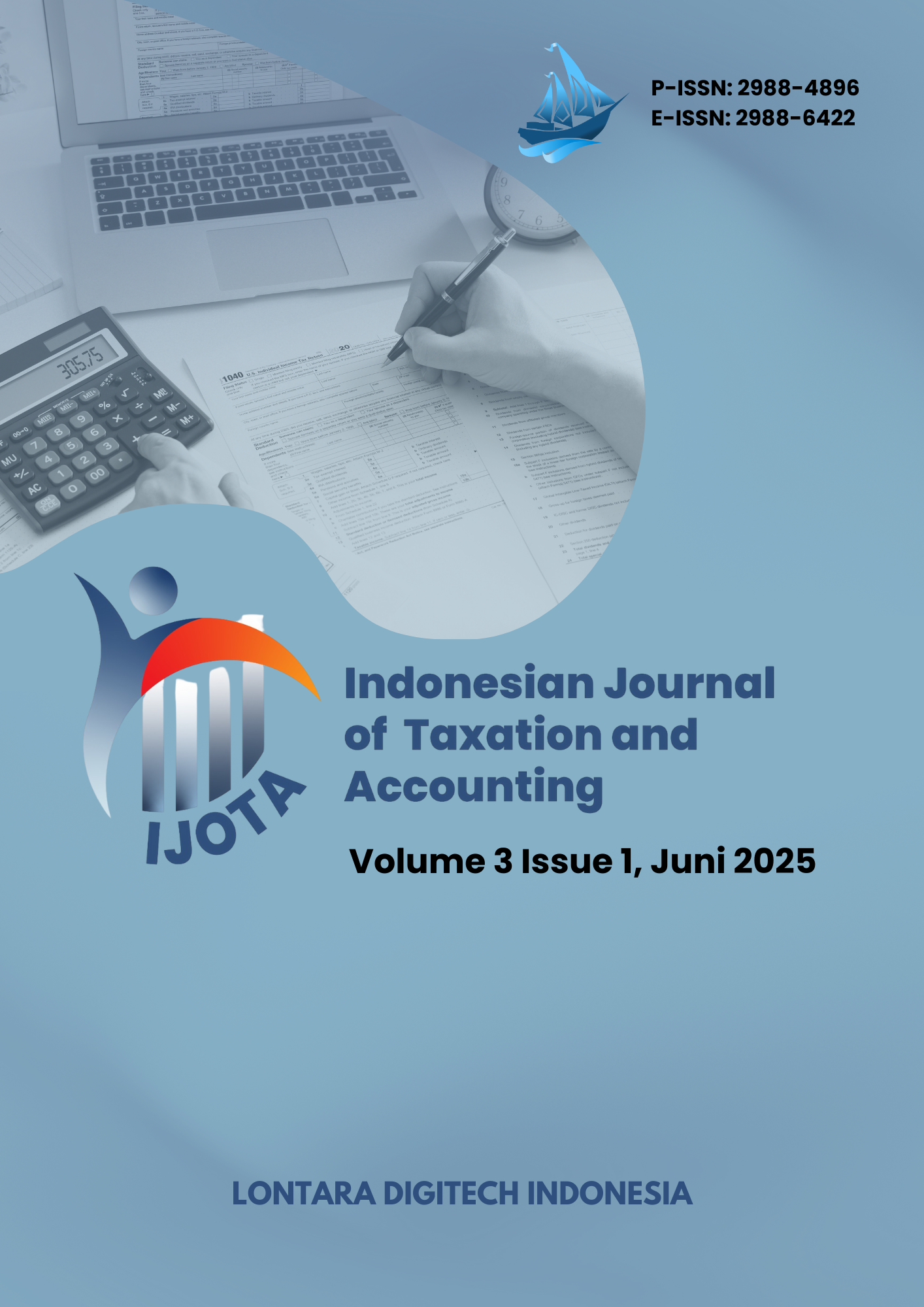Pengaruh Love Of Money dan Self Assessment System Terhadap Tax Evasion: Peran Moderasi Akhlak
The Effect of Love Of Money and Self Assessment System on Tax Evasion: The Moderating Role of Morals
DOI:
https://doi.org/10.61220/Keywords:
Tax Evasion, Love of Money, Self Asessment System, AkhlakAbstract
This study aims to examine the influence of love of money and the self assessment system on tax evasion, with morality as a moderating variable. The research adopts a quantitative approach using a causal comparative method. The sample consisted of 100 respondents, namely muslim individual taxpayers registered at KP2KP Sungguminasa, selected through purposive sampling techniques. Data were collected using questionnaires and analyzed using multiple linear regression and Moderated Regression Analysis (MRA) with an absolute difference approach. The results indicate that love of money has a significant positive effect on tax evasion, with a p-value of 0.001. similarly, the self assessment system also shows a significant positive effect on tax evasion, with a p-value of 0.003. Meanwhile, morality does not moderate the relationship between love of money and tax evasion (p= 0.080), but it does moderate the relationship between the self assessment system and tax evasion, with a p-value of 0.015. The implications of this study underline the importance of moral formation in improving tax compliance, so that efforts to prevent tax evasion can be carried out more effectively.
References
Amelia, Y., Permana, N., & Savitri, S. A. (2022). Pengaruh Keadilan Pajak , Sistem Pajak , Dan Love of money Terhadap Persepsi Mahasiswa Mengenai Penggelapan Pajak ( Tax evasion). Ekonomika, 6(2), 440–455.
Ashari, F. R., Kara, M., & Bulutoding, L. (2020). Pengaruh Money Ethics dan Ketidakpercayaan Kepada Fiskus Terhadap Tax Evasion Dengan Keimanan Sebagai Variabel Moderasi. Islamic Accounting and Finance Revie, 1(2), 14–28.
Bulutoding, L., Alwi, Z., & Dwiayuparmitasari, R. (2020). Akhlaq of Zakat Behavior among Determinant Factors of Intention in Malaysia: A Perspective of Prophet Muhammad Tradition. Journal of Advanced Research in Dynamical and Control Systems, 12(6), 902–912.
Bulutoding, L., Asse, A., Habbe, A. H., & Fattah, S. (2018). The Influence of Akhlaq to Tax Compliance Behavior , and Niyyah as Mediating Variable of Moslem Taxpayers in Malaysia. Scientific Research Journal, 6(I), 26–34.
Christina, & Ngadiman. (2022). Pengaruh Keadilan Pajak, Sistem Perpajakan, dan Pemeriksaan Pajak Terhadap Penggelapan Pajak (Tax evasion). Jurnal Multiparadigma Akuntansi, 4(1), 444–453.
Dewi, N. D. S., & Febriansyah, A. (2023). Pengaruh Pemeriksaan Pajak dan Self Asessment System Terhadap Penggelapan Pajak (Studi Kasus Pada Kantor Pelayanan Pajak Pratama Bandung Cibeunying). Jurnal Of Econimics Management Business and Accounting , 3(1), 94–104.
Ervana, O. N. (2019). Pengaruh Pemeriksaan Pajak, Keadilan Pajak dan Tarif Pajak Terhadap Etika Penggelapan Pajak (Studi Kasus Kantor Pelayanan Pajak Prama). Jurnal Akuntansi Pajak Dewantara , 1(2).
Hakki, T. W., Simanungkalit, J., & Siat, M. (2023). Pengaruh Tax Self-Asessment System, Money Ethics, dan Religiusitas Terhadap Tax Evasion. Jurnal Analisa Akuntansi Dan Perpajakan, 7(2), 160–171.
Jumiati. (2022). Pengaruh Love of Money dan Keadilan Pajak Terhadap Tax Evasion dengan Budaya Siri’ Na Pacce Sebagai Pemoderasi. Unpublished Undergraduate Thesis. Program Sarjana. Makassar: UIN Alauddin.
Karlina, Y., Kurniawan, A., & Umiyati, I. (2020). Faktor-Faktor Yang Mempengaruhi Niat Melakukan Penggelapan Pajak. Journal of Accounting for Sustainable Society (JAAS), 2(2), 28–54.
Kumalasari, Bulutoding, L., & Fadhilatunisa, D. (2023). Pengaruh Love of Money dan Ketidakpercayaan Kepada Fiskus Terhadap Tax Evasion dengan Iman Islam Sebagai Variabel Moderasi ( Studi pada Wajib Pajak Orang Pribadi Muslim yang Terdaftar di Kanwil DJP Sulselbartra ). Accounting, Accountability and Organization System (AAOS) Journal, 4(2).
Mirayani, L. P. M., & Rengganis, R. M. Y. D. (2023). Pengaruh Sistem Perpajakan dan Sanksi Pajak Terhadap Persepsi Penggelapan Pajak Dimoderasi Preferensi Resiko. Jurnal Krisna: Kumpulan Riset Akuntansi, 15(1).
Murtin, A., Rif’ah, A. N., Ummah, R. S., & Juanda. (2023). Pengaruh Self-Assessment System dan Love of Money Terhadap Tax Evasion: Peran Pemoderasi dengan Religiusitas Intrinsik. Reviu Akuntansi Dan Bisnis Indonesia, 7(1), 248–263.
Rais, D. M., & Tanno, A. (2023). Pengaruh Love Of Money Terhadap Tax Evasion Dengan Tingkat Pendidikan Sebagai Variabel Moderasi (Studi Empiris Wpop Yang Terdaftar Pada KPP Pratama Padang Satu). In Management Studies and Entrepreneurship Journal, 4(5).
Rizki A, I. (2018). Self Asessment System Sebagai Dasar Pungutan Pajak di Indonesia (Analisa Hukum Tentang Ketentuan Umum Dan Tata Cara Perpajakan). Jurnal Al-’Adl, 11(2).
Sari, N. P. P., Sudiartana, I. M., & Dicriyani, N. L. G. M. (2021). Pengaruh Keadilan Pajak, Sistem Perpajakan, Tarif Pajak dan Sanksi Perpajakan Terhadap Persepsi Wajib Pajak Badan Mengenai Etika Penggelapan Pajak (Tax Evasion). Jurnal Kumpulan Riset Mahasiswa Akuntansi (KHARISMA), 3(1), 140–149.
Styarini, D., & Nugrahani, T. S. (2020). Pengaruh Love Of Money, Machiavellian, Pemahaman Perpajakan, Tarif Pajak, dan Self Assessment System Terhadap Tax Evasion. Akuntansi Dewantara, 4(1), 22–32.
Sugiyono. (2017). Metode Penelitian Kuantitatif , Kualitatif, dan R&D. Bandung: Alfabeta.
Wardani, D. K., & Puji, R. (2020). Pengaruh E-Commerce, Tarif Pajak Terhadap Penggelapan Pajak. Jurnal Akuntansi & Ekonomi, 5(1), 43–49.
Widodo, A. A., & Sriwidodo, J. (2023). Efektivitas Self Asessment System Pada Pelaporan Pajak. Palar (Pakuan Law Review), 9(3), 1–10.
Yusdin. (2020). Pengaruh Pemahaman Peraturan Perpajakan, Kualitas Pelayanan Fiskus, dan Penegakan Hukum Pajak Terhadap Perilaku Kepatuhan Wajib Pajak Dengan Akhlakul Karimah Sebagai Variabel Moderasi. Unpublished Undergraduate Thesis. Program Sarjana. Makassar: UIN Alauddin.
Zainuddin, Mahdi, S. A., & Ismail, A. A. (2021). Faktor-Faktor Yang Mempengaruhi Persepsi Etis Penggelapan Pajak. Jurnal Informasi, Perpajakan, Akuntansi, Dan Keuangan Publik, 16(1), 41–64.
Downloads
Published
Issue
Section
License
Copyright (c) 2025 Nurdalila Ashilah Ubaid, Lince Bulutoding, Della Fadhilatunisa (Author)

This work is licensed under a Creative Commons Attribution-ShareAlike 4.0 International License.
















 Email : ijota@lontaradigitech.com
Email : ijota@lontaradigitech.com
